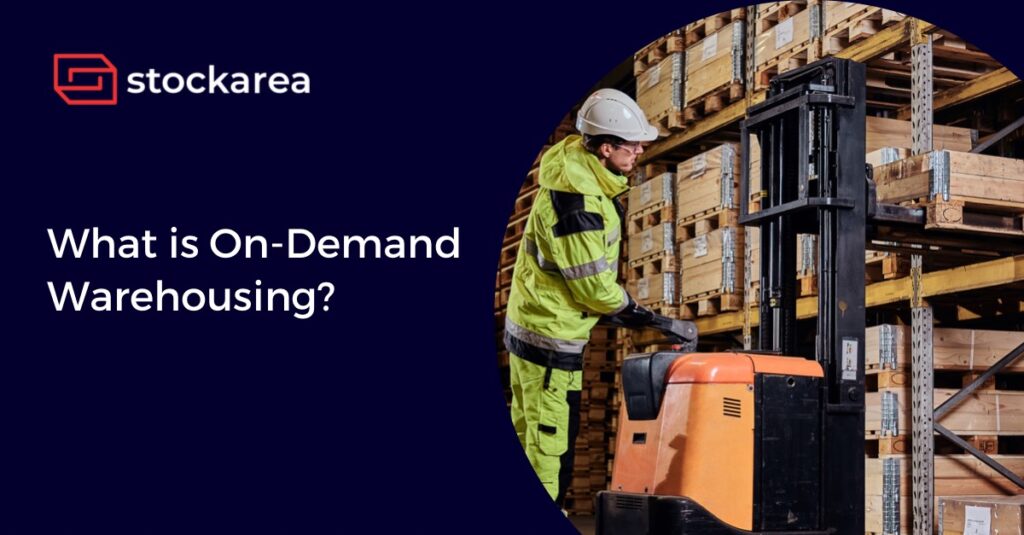On-demand warehousing is a flexible solution for businesses seeking to expand and manage inventory fluctuations. It allows businesses to use warehouse services on an as-needed basis through a pay-per-use model, allowing them to avoid making long-term commitments. Multiple industries, including those dealing with fast-moving consumer items, industrial production, and hospitality, can benefit from on-demand warehousing. This concept can be utilised by both large and small businesses trying to improve their supply networks
What solutions does On-Demand Warehousing offer?
On-demand warehousing can accommodate various use cases, with inventory overflow, eCommerce fulfillment, and retail distribution being the three critical solutions.
1. Inventory overflow
For anticipated seasonal peaks or unanticipated excess inventory, on-demand warehousing enables retailers and brands to add more capacity. It is a complete answer to unpredictable storage needs.
2. E-Commerce fulfillment
With on-demand storage for eCommerce fulfillment, merchants and brands have the flexibility to scale their fulfillment networks as needed to improve their direct-to-consumer strategy. Retailers and brands can establish temporary warehouse and fulfillment networks to enhance delivery promises, explore new markets, and generate temporary product promotions.
3. Retail distribution
For brands that distribute their products to retail partners, on-demand warehousing assists sellers in mitigating inventory storage costs and shortening last-mile transportation by holding goods closer to intake centers.
Benefits of On-Demand Warehousing
Whether you have run a business for a while or are contemplating establishing one, you are likely aware that the costs associated with warehousing can be exorbitant. In other circumstances, managing a warehouse is so time-consuming that it inhibits individuals from establishing the business they’ve always wanted. On-demand warehousing can alleviate your anxiety by resolving numerous frequent problems. Here are some of the most significant advantages to consider.
1. Integrated Technology
On-demand storage is supported by cutting-edge technology that automates manual procedures. New fulfillment technology seamlessly links your sales channels with your supply chain and provides complete visibility into your inventory levels across all warehouse sites and sales channels. It also permits the migration of inventory to more profitable or high-volume sales channels. Additional insight into the fulfillment and delivery statuses guarantees that service levels are maintained and that consumers are continuously informed about the status of their orders.
2. Accessibility
Perhaps the greatest advantage of on-demand warehousing is its accessibility and convenience. The finest and most prevalent model is one in which the warehouse owner also acts as a fulfillment company, handling not only storage but also ordering, stocking, picking, packing, and shipping, among other tasks. This affords you the convenience of deciding what you will manage yourself and what you will have your fulfillment partner handle. This is a game-changer for many business owners, particularly small business owners seeking growth and expansion.
3. Cost Savings
When you collaborate with a provider of on-demand warehousing, you enter into a flexible service agreement that allows you to pay just for the space and labour costs necessary to maintain a viable business. You can adjust inventory levels as needed without incurring additional costs or paying strict storage fees that do not match your store’s requirements.
Why is On-Demand Warehousing essential?
On-demand warehousing addresses the issue of the ever-growing demand for warehouse space. Historically, businesses that required additional space had to lease a warehouse or pay a 3PL warehouse for its space. The issue of being bound to a lease is now resolved by on-demand warehousing. Seasonal fluctuations in inventory demands, product promotions, bulk purchasing, same-day/next-day delivery demands, new items, end-of-year issues, product recalls, and other factors necessitate an increase in warehouse capacity. On-demand warehousing addresses the requirement for more warehouse capacity and extends its advantages to the fulfilment procedure. This is a tremendous benefit for small and expanding merchants, who can now compete with larger enterprises that have their own warehouse space.
Related posts
- 13 Most Important Warehouse Processes
- What Is Warehousing?
- How to start a warehouse business
- Everything You Need To Know About A Bonded Warehouse
- 10 Practical Tips To Reduce Warehouse Costs
- 8 Key Functions Of Warehouse Management System (WMS)
- 6 Major Benefits Of Bonded Warehouse
- 7 Best Warehouse Management Practices
- Logistics Warehouses Quickly Adopting Automation to Reduce Walk Time
- Warehouse Management System (WMS)
- Top 10 Freight Forwarding Companies In Bangalore
- Role Of Warehouses In Supply Chain
- Cold Storage: Challenges & Opportunities
